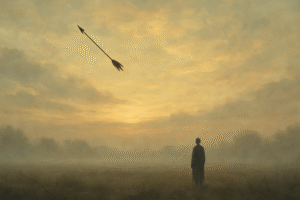The Arrow Has Already Left the Bow
Understanding Prarabdha karma and the freedom of becoming a witness.
Written by Harshna Chandolia, 1st June, 2025
 A Story That Changed the Way I Understand Life
A Story That Changed the Way I Understand Life
There is a metaphor from Adi Shankaracharya’s commentaries that continues to guide me every time I feel swept up in the highs or the lows of life.
It goes like this:
Once the arrow has left the bow, it cannot be recalled. It must complete its course, whether it brings victory or harm.
This is how Shankaracharya describes Prarabdha karma — the set of experiences already released into motion from past action. You cannot undo them. You cannot negotiate your way out. You can only live through them.
But what struck me most is this: not just the painful moments, but also the joyful ones — the praise, the rewards, the successes — are all part of this arrow in flight.
Joy and Pain Are Both in Motion
We often talk about karma as a way to explain our struggles — the heartbreak, the illness, the loss. But even the moments of grace, love, and recognition are Prarabdha. They too are passing through. They too were set in motion long before we tried to take credit for them.
The bow was pulled. The arrow released. And now, all we’re experiencing is the momentum.
And that’s where freedom begins.
When I truly understood this, something softened.
I stopped chasing meaning in every event.
I stopped clinging to the good and resisting the bad.
I began to observe both with equal clarity — not indifference, but awareness.
The Role of the Witness
This is the essence of Vedanta: you are not the arrow, and you are not the target. You are the witness of both.
Whether life brings you applause or silence, chaos or calm — you are the one watching it all unfold.
And the more you rest in that witnessing, the less entangled you become.
You still show up.
You still act.
You still love.
But you stop taking it all so personally.
Because you know: this too is just an arrow passing through.
Let It Land, Let It Pass
So the next time something beautiful happens, enjoy it — but don’t grip it.
And the next time something painful arrives, feel it — but don’t make it your identity.
Neither is a reflection of your worth. Both are reflections of momentum.
This is not a rejection of life. It’s the deepest participation in it — without losing yourself in the waves.
And maybe that’s what Shankaracharya wanted us to remember:
Liberation is not about escaping the world. It is the quiet knowing that you are the witness — and that no experience, however sweet or sharp, is yours to cling to.